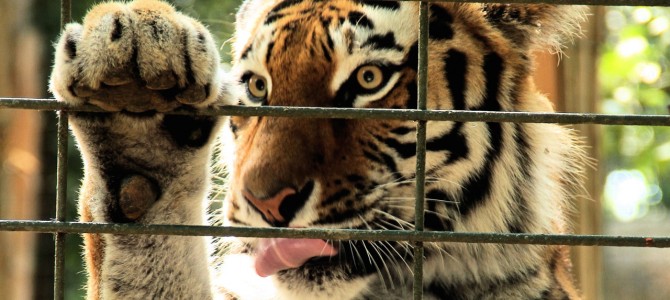
The year that we were married, my husband and I were given a truly wonderful gift: a honeymoon safari to southern Africa. It was an amazing experience. We now have all the magical memories that one would hope to bring home from a safari: the fresh lion kill, the mother elephant tenderly caressing her baby, the warthog crashing through the undergrowth with a leopard in hot pursuit. I could go on (and on and on), but nothing’s more pretentious than regaling people with tales of your honeymoon safari, so I’ll just reiterate once more: completely fabulous.
You meet a lot of rich people on safari. For a youth-hostel veteran such as myself, it felt odd to be wined and dined like some kind of colonial grandee, which is pretty much how it goes in these high-end safari lodges. Our fellow guests (not struggling academics like ourselves) were clearly more accustomed to this kind of service. We met wealthy bankers and businessmen from around the world, several of whom were there with their wives and kids on extended African tours. They’d swap stories of previous safaris and luxury trips, and complain about the stinginess of African ATMs. (“You can only get five hundred dollars a day and that’s what, a morning’s entertainment costs?”)
One morning at the breakfast table I overheard them conversing about the evils of zoos. Such depressing places, zoos! What kind of person would take children to see wild animals confined to little cages, when they could benefit infinitely more from the authentic, complete-ecosystem Botswana nature experience? You could almost feel the waves of moral indignation pulsing through the table.
Don’t get me wrong. I have no grudge against the rich, and taking the family on safari is absolutely something I would do if I had those kinds of resources. I would just suggest, though, that most parents have a very compelling reason for choosing the zoo over the complete Botswana nature experience.
Reading over Liz Tyson’s recent editorial on the moral necessity of shutting down zoos, I immediately remembered these global grandees and their fat-wallet “let them take safaris” moralizing. As a fellow nature lover (and safari veteran!), I wish to offer a rebuttal on behalf of the local zoo.
The Ecosystem Connoisseur
To start off, I should note that I am not entirely unsympathetic to the zoo-hater’s perspective. I’m aware that some people would dismiss Tyson’s squeamishness about cages as so much bleeding-heart liberal silliness, but I’m willing to give her more credit. Tyson is a professional conservationist. She’s lived in the Amazon and worked on conservation projects; now she is pursuing graduate research along the same lines. I suspect that she is a true nature-lover who is genuinely distressed about the ethical implications of caging wild animals for the amusement of humans. I’m willing to hear her out.
Moreover, I can appreciate how zoos might offend the sensibilities of a person who spends her life reflecting on the beautiful balance of complex ecosystems. I expect her feelings are similar to those of a Louvre Museum curator who cringes to see the tourists outside paying lavishly for sidewalk kitsch. Or, picture a master sommelier who is handed a glass of Charles Shaw White Zinfandel. To the developed eye, ear or palate, cheap or artificial substitutes are displeasing; they want the good stuff. Zoos can reasonably be seen as a collection of “cheap knockoff” pseudo-ecosystems designed to provide a synthetic nature experience that is suitable for mass consumption.
If zoos are to a conservationist what fast food is to a chef, Tyson’s zoo aversion is understandable. But of course, she needn’t actually visit zoos if she doesn’t like them, so that’s not an argument for closing them down. For most people they remain the primary available form of access to ”exotic” (as opposed to local) nature. And even if it were financially feasible for every zoo-goer to visit Botswana, Costa Rica and Malaysia, that level of tourism would put a serious strain on the natural environments that Tyson loves. Thus I would advise her (along with my fellow safari-camp lodgers) to reflect on the following question. Should rich kids be the only ones who ever get to see a lion?
Ethical Questions
No reasonable person supposes that lion-watching is a necessity of human life. If zoos require us to engage in unjust or immoral practices, we should close them. In the end I don’t believe that they do, but Tyson’s charges are serious enough to merit consideration.
The immediate provocation for Tyson’s missive was a recent incident in which the Copenhagen Zoo admitted to killing a family of healthy lions in order to diminish the risk of inbreeding. Tyson suggests that zoos will always need to kill healthy animals, since their populations lack the genetic diversity necessary to allow for uncontrolled breeding. This seems plausible. The intentional killing of healthy lion cubs upsets me less than the intentional killing of healthy unborn humans (which is a regular occurrence in Copenhagen), but it’s no cause for celebration.
Zoos raise other ethical concerns as well. They deprive animals of their freedom and force them to live under heavily constricted conditions. Clearly it would be unacceptable to impose this kind of restriction on humans, and although zoos do care for their bestial charges (often with real concern and affection), I think we should acknowledge that animals lose something significant when we remove them from the natural setting to which they are adapted. Just like humans, animals will often choose a life of comfortable indigence over the challenges of freedom, but just like humans, I believe that they ultimately benefit more from living in a harsher environment that motivates them to cultivate whatever excellences are natural to their kind.
Does it matter? In a world full of human suffering, it’s hard to decide how much attention we should give to the welfare of animals. I myself would deny that animals can have rights as such (since rights both flow from and are due to properly rational creatures), but I think most of us have clear intuitions that animal thriving is a good thing, and that animal suffering is bad. We know that a happy sparrow is better than a sickly sparrow, that the mother bear who fiercely defends her cub is worthy of admiration, and that torturing cats is morally depraved.
At the same time, animal rights activists are often inattentive to an equally intuitive point: There is a hierarchy of creatures, in which human good is properly valued above that of beasts. In actual life we all know this. If you accidentally kill a wolf or a bobcat with your car on the way to work, you might feel some pangs of emotion. A dead squirrel is considerably less upsetting, and a banana slug not worth a second thought, but killing a child would be a life-altering trauma even if the child were unknown to you and you were not at fault. Not all creatures are equally precious and it’s sometimes appropriate to subordinate animal welfare to that of humans. That’s why my general affection for beasts doesn’t deter me from digging into a juicy steak or serving up a plate of ribs.
Animal welfare still matters, particularly when we’re discussing highly social and intelligent animals of the sort that populate zoos. But even if you think (as I do) that a zoo cage is a sub-optimal environment for a wild animal, I have trouble regarding animal captivity as a real tragedy. Zoo animals don’t appear to be suffering. They develop positive attachments to their human keepers and to other animals in their enclosure; some of the more social animals enjoy interacting with zoo visitors. They take obvious pleasure in food and exercise and a warm summer day. Can animals have the kind of interior life that would enable them to conceal intense emotional pain? I can’t say for certain of course, but given their evident lack of rational planning and self-control, I’m inclined to doubt it. Given how many humans in this world are living under conditions of true hardship, I’d say that we needn’t lose much sleep over the plight of the local sea lions.
Nature for the Common Man
Are zoos valuable? Even if the injury we do to zoo animals is relatively slight, it still might not be justified if there is no corresponding benefit. This is obviously Tyson’s belief, as evidenced by her dismissal of zoos as mere “entertainment”.
Let’s assume for the sake of argument that zoos contribute nothing of significance to conservation and zoological research. Would it be worth keeping them for “entertainment” alone? As a mother who has spent countless hours with my children at the nearby local zoo, I would argue that it is.
I discovered the Como Park Zoo and Conservatory shortly before my first child was born. On a global index of must-see zoos, ours probably doesn’t rank near the top, but I’m confident it will linger in my kids’ memories as one of the most beloved places of their childhood. I joke to my friends that we’re “zoo junkies” because we generally visit once a week. Those animals are like old friends to my kids, and I’ve outlined many an article from the bench of the monkey house on a quiet winter afternoon. When there are no other visitors, the monkeys will sometimes come down and interact with the boys from the other side of the glass. That’s just one of the many precious memories I’ll keep from our visits to Como.
One of the amazing things about Como is that it’s free to the public (with suggested donation) and enjoys substantial community support, including an army of dedicated and wonderfully knowledgeable volunteers. I’m not in a financial position to be a noteworthy benefactress, but if the zoo is ever in danger of closing I’ll be happy to weep openly on the news and beg local benefactors to think of the children. Dismissing it as “mere” entertainment completely misses the real value that such a place can have in the life of a child.
When we see animals in real life, we get a perspective on the natural world that we just can’t get through television. My kids watch TV, but at their age, understanding the reality of what lies behind the flickering images is quite difficult. (I find that older people often have this problem too.) Recognizing that fact makes me that much more grateful for the opportunity to give them a direct encounter with lions, tigers and bears.
Zoo animals have been their primary conduit for coming to understand that the world contains a diverse array of climates and ecosystems. We discuss why it is that the tiger comes outside in the winter but the giraffes not. We note how the arctic foxes exchange their white coats for grey ones as the seasons change. Even contrived, pseudo-ecosystems enable the kids to recognize how particular animals are suited to their environments. They marvel at the upper-body strength of monkeys and note with amazement that both polar bears and seals, despite their many differences, are adapted to swimming. A nature show could point this out, but they benefit far more from making the connection themselves.
As they mature, they make cultural connections too. While examining the tiger one afternoon, and my eldest son began explaining to me why tigers seemed to have particularly fearsome and intimidating features (those glowing yellow eyes!), almost as though by design. Didn’t somebody write a poem about that? The connections arise in other contexts too. Once we were discussing the seven deadly sins, and when we came to the sin of sloth, my son cried, “Like the sloth in the zoo! It’s always sleeping.” We have a winner.
In the zoo the children can interact with animals. I like to think that this is a “perk” that zoo animals get over their wilder counterparts. Our sea lions will sometimes initiate a game of “catch” with visitors. (We throw a football back and forth over a five-foot wall.) The giraffes occasionally try to nibble their hair. Again, this makes the natural world a reality for them in a way that pictures and nature shows could never do.
Does a trip to the Como Zoo have the same value as a full African safari? No. Of course not. I’m in a position to know. Nevertheless, real contact with animals is valuable for humans, and particularly for children. It’s entertainment, but it’s the sort of entertainment that opens windows to other corners of our wonderful planet. I think in the longer run, these encounters with animals will help kids to consider deeper moral questions about what nature is worth, and what it might mean to exercise good stewardship over the earth’s natural treasures. Just a little food for thought for all you zoo-hating conservationists out there.
Rachel Lu teaches philosophy at the University of St. Thomas. Follow her on Twitter.








